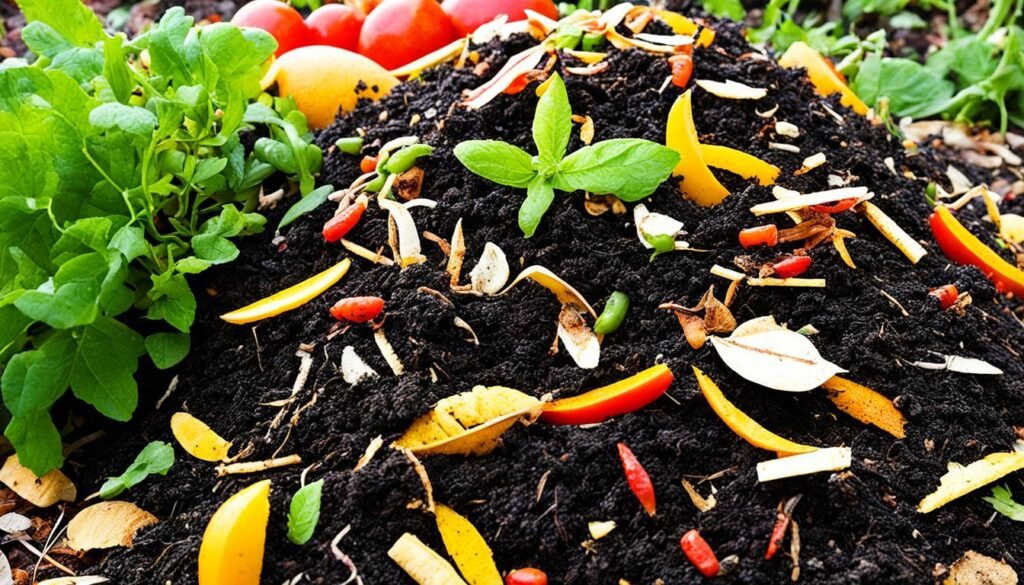
Did you know that Earth Day, which originated as a small, grassroots movement, is now celebrated by over 1 billion people in 193 countries around the world? This global day of environmental awareness, observed annually on April 22, has become a powerful platform for promoting sustainable living, climate action, and conservation efforts.
While Earth Day serves as a reminder of our responsibility to protect and preserve nature, it’s crucial to incorporate eco-friendly practices into our daily lives beyond this single day. By making small changes in our habits and embracing green initiatives, we can collectively make a big difference in preserving our planet for future generations. Let’s explore some earth-friendly tips and practical actions that can help us create a greener and more sustainable future.
Key Takeaways:
- Earth Day is celebrated by over 1 billion people in 193 countries worldwide.
- Embracing eco-friendly practices is essential for a greener future.
- Small changes in daily habits can have a significant impact on the environment.
- Climate action and conservation efforts are vital for preserving nature.
- Let’s commit to a sustainable lifestyle and celebrate Earth Day every day.
What Going Green Means
Going green means embracing a mindful, eco-friendly, and sustainable lifestyle. It goes beyond a one-day event; it’s a commitment to a greener future. By engaging in mindful living and learning about environmental subjects, we can make conscious choices that benefit both ourselves and the planet.
When we go green, we understand the importance of alternative energy sources, biodiversity, conservation, organic farming, responsible travel, and sustainable development. These subjects broaden our knowledge and inspire us to take action in our daily lives.
Going green is not limited to a specific location or background; it is accessible to everyone. Whether we are cleaning our homes, tending our gardens, going to work, eating, traveling, using water, or disposing of waste, there are eco-friendly choices we can make at every step.
By embracing ecologically responsible practices, we actively contribute to protecting and regenerating natural resources. Our collective impact on the planet becomes even greater as we seek new ways to create a sustainable future.
The Impact of Going Green
When we embrace a sustainable lifestyle, we become catalysts for change. Our actions promote a greener world for future generations, creating a positive ripple effect. By adopting an eco-friendly approach to living, we encourage others to do the same.
We hold the power to make a difference in our hands. Going green is not just a personal choice; it’s a responsibility we all share.
By making sustainable choices in our everyday lives, we actively contribute to the preservation of our environment. We reduce our carbon footprint, conserve natural resources, and minimize waste. Every small step counts, and together, we can create a significant impact.
How Going Green Affects Our Daily Lives
Going green encompasses every aspect of our daily routines. From the moment we wake up to the time we go to bed, we have opportunities to make environmentally conscious decisions.
We can implement eco-friendly practices in our homes, such as using natural and non-toxic cleaning products, reducing energy consumption, and properly managing waste through recycling and composting.
In our gardens, we can embrace organic gardening methods, conserve water through mindful irrigation techniques, and create habitats for wildlife.
When it comes to transportation, we can opt for greener alternatives like carpooling, biking, or using public transportation. Planning responsible and sustainable travel is also a way to make a positive impact.
Our choices in the kitchen, from minimizing food waste to reducing plastic packaging, contribute to sustainable living. By opting for locally sourced and organic foods, we support sustainable farming practices.
Conserving water and using it efficiently is essential. We can practice water-saving techniques like taking shorter showers, fixing leaks, and using rainwater collection systems.
Going green also means being mindful of the products we consume and their impact on the environment. Choosing eco-friendly and sustainable goods promotes a circular economy and reduces our reliance on single-use items.
The Benefits of Going Green
Embracing a green lifestyle offers numerous benefits, both for individuals and the planet as a whole. By going green, we contribute to a healthier environment, improved air quality, and the conservation of natural resources.
Living sustainably can also improve our overall well-being. Engaging with nature, practicing mindful living, and reducing our exposure to harmful chemicals lead to a healthier and more fulfilling life.
As we spread awareness and inspire others to join us on this eco-conscious journey, we create a sense of community. By coming together, we increase our collective impact and accelerate positive change.
| Benefits of Going Green | Impact |
|---|---|
| Environmental conservation | Preserving natural resources for future generations |
| Improved air and water quality | Creating healthier living environments |
| Reduced carbon footprint | Minimizing greenhouse gas emissions |
| Cost savings | Lowering energy and water bills through efficient practices |
| Community engagement | Inspiring others to take eco-friendly actions |
Reduce/Reuse/Recycle Tips
Reducing our environmental impact is essential for creating a sustainable future. By following the “Three R’s” – reduce, reuse, and recycle – we can make a significant difference in our daily lives. Here are some practical tips to help us embrace these eco-conscious practices:
Participate in America Recycles Day
One way to educate ourselves about recycling options in our community is by participating in America Recycles Day. This event, held every year on November 15th, raises awareness about the importance of recycling and encourages individuals to take action.
Donate Unwanted Items
Items that we no longer need or use can find new life through donation. Make a difference by donating unwanted clothes, furniture, electronics, and household items to organizations like Goodwill or listing them on platforms like Freecycle. By doing so, we not only reduce waste but also give others the opportunity to reuse these items.
Support Eco-Friendly Companies
When making purchasing decisions, consider buying products made from recycled materials. Look for eco-friendly companies that prioritize sustainability in their manufacturing processes. By supporting these businesses, we contribute to reducing the demand for new resources and encourage a circular economy.
Embrace Composting
Composting is an effective way to reduce waste and create nutrient-rich soil for our gardens. By composting food scraps, yard waste, and other organic materials, we divert them from landfills and contribute to a healthier environment. Start a compost pile in your backyard or explore community composting options in your area.

Reducing, reusing, and recycling are powerful actions that each of us can take to minimize our impact on the planet. By implementing these tips, we can contribute to a more sustainable future for ourselves and future generations.
Kitchen Green Tips
The kitchen is a place where we can implement green practices. By adopting simple and eco-friendly habits, we can reduce our environmental impact and contribute to a healthier planet. Here are some tips to make your kitchen more sustainable:
Energy-Saving Cooking
Save energy and reduce your carbon footprint by implementing these energy-saving cooking practices:
- Use lids on pots and pans to retain heat and cook food faster.
- Multitask while cooking to make the most of your time and energy.
- Instead of preheating the oven, consider using the microwave for quick cooking tasks.
- Opt for energy-efficient appliances when it’s time to replace old ones.
Reusable Alternatives
Minimize waste in the kitchen by replacing disposable products with reusable alternatives:
- Use washable sponges and towels instead of paper towels and disposable wipes.
- Invest in reusable containers and food wraps to store leftovers.
- Choose durable kitchen tools and utensils instead of single-use gadgets.
Natural Cleaners
Clean your kitchen surfaces without harsh chemicals by utilizing these natural cleaning alternatives:
- Mix lemon juice with water for an effective and natural disinfectant.
- Baking soda paste can remove stubborn stains and grease.
- Vinegar and water solutions work well for cleaning windows and mirrors.
Coffee Grounds
Repurpose used coffee grounds instead of throwing them away:
Coffee grounds can be used as pest repellents in your garden and as cleaning agents for hard-to-remove stains. Their abrasive texture makes them perfect for scrubbing pots and pans!

These eco-friendly practices can help you create a more sustainable kitchen and reduce your ecological footprint. By making small changes in our daily routines, we can make a big difference in preserving our planet for future generations.
| Benefits of Green Kitchen Practices | |
|---|---|
| Reduced energy consumption | Lower carbon emissions |
| Minimized waste generation | Protects natural resources |
| Cost savings on disposable products | Healthier living environment |
Eco-Friendly Bathroom Tips
The bathroom offers numerous opportunities for incorporating eco-friendly practices into our daily routines. By adopting simple changes and making conscious choices, we can contribute to a greener future. Here are some practical and eco-conscious tips for creating an environmentally friendly bathroom:
1. Non-Toxic Cleaners
Swap out harsh chemical cleaners with non-toxic alternatives. Mix vinegar and water for an effective all-purpose cleaner that can tackle mildew and soap scum. Baking soda paste is excellent for scrubbing tough stains and maintaining a clean bathroom.
2. Water Conservation
Water is a precious resource, and conserving it in the bathroom is crucial. Install low-flow showerheads and faucets to reduce water usage without compromising your shower experience. Consider dual-flush toilets that allow for different water volumes based on the type of waste.
3. Recycling Electronics
Dispose of old electronics responsibly by recycling them. Many electronic retailers, local recycling centers, and organizations offer drop-off locations where you can safely recycle your old devices. Recycling electronics helps minimize electronic waste and prevent harmful substances from entering landfills.
4. Reducing Paper Waste
Reduce paper waste by adopting simple switches. Replace disposable paper towels with reusable cloth towels or bamboo alternatives. Instead of conventional toilet paper, consider using eco-friendly options made from recycled materials or bamboo fibers.
5. Eco-Friendly Bathroom Projects
Embark on eco-friendly bathroom projects to make a lasting impact. Consider installing energy-efficient lighting fixtures or skylights to maximize natural light and reduce energy consumption. Focus on using sustainable and durable materials when renovating, such as bamboo flooring or recycled glass countertops.
6. Visual Appeal and Functionality
Create an inspiring and eco-conscious bathroom by incorporating natural elements. Use plants to purify the air and add a touch of greenery. Opt for sustainable bathroom accessories, such as bamboo toothbrushes or recycled glass soap dispensers, to enhance the aesthetic appeal while reducing waste.
By implementing these eco-friendly bathroom tips, we can transform our bathrooms into a sustainable oasis. Let’s prioritize conscious choices and take responsibility for protecting the environment, one bathroom at a time.

Home Energy-Saving Tips
Conserving energy and reducing waste are essential steps toward creating a greener future. By implementing simple habits and making conscious choices, we can significantly reduce our environmental impact. Here are some home energy-saving tips to help you embrace sustainability:
1. Turn off lights and electronics: Make it a habit to switch off lights, TVs, and other electronic devices when they are not in use. Even standby mode consumes energy.
2. Use a programmable thermostat: Installing a programmable thermostat allows you to regulate your home’s temperature based on your schedule, reducing energy waste and saving money.
3. Opt out of catalogs: By going digital and opting out of catalogs, we can reduce paper waste and promote sustainable practices in the retail industry.
4. Invest in Energy Star appliances: When it’s time to replace old appliances, choose Energy Star qualified models. These appliances are more energy-efficient and can significantly reduce electricity consumption.
5. Embrace natural ventilation: During pleasant weather, open windows and use natural airflow to cool your home instead of relying solely on air conditioning. Utilizing ceiling fans can also enhance natural ventilation.
6. Regularly change air filters: Clean air filters allow for better airflow and help your heating and cooling systems operate more efficiently, conserving energy.
By making these energy-saving changes in our homes, we not only reduce our carbon footprint but also contribute to a more sustainable future for our planet.
Conclusion
Earth Day is more than just a one-day celebration; it is a reminder of our collective environmental commitment. By taking individual actions, we have the power to make a global impact. Through our efforts in reducing, reusing, and recycling, we can minimize waste and conserve precious resources. By conserving energy and water, we can contribute to a healthier planet for future generations.
Let us be inspired by Earth Day to cultivate a more sustainable and eco-conscious lifestyle. Every small step we take towards embracing a greener lifestyle counts. Together, we can protect and preserve our planet for the years to come. So, let’s continue celebrating Earth Day every day, and let our actions speak loud and clear: we are committed to making a difference.
Join the worldwide Earth Day celebration and let your individual actions create a ripple effect. Remember, your efforts matter, and together, we can create a brighter, greener future for all.
Before concluding, take a few minutes to visit our partner store related to Gardening
FAQ
What does it mean to “go green”?
How can I reduce, reuse, and recycle?
What are some green tips for the kitchen?
How can I make my bathroom more eco-friendly?
How can I save energy at home?
How can we celebrate Earth Day every day?
Source Links
- https://greenglobaltravel.com/going-green-earth-day-tips/
- https://harmony1.com/ideas-to-make-your-earth-day-even-greener/
- https://www.abbott.com/corpnewsroom/sustainability/10-ways-to-honor-earth-day-every-day.html
The Baffls Team (info@baffls.com)
Follow Us on https://www.Baffls.com (Facebook – Twitter/X)
#EarthDayAwareness #SustainableLiving #GreenFuture
Disclosure: This post contains affiliate links. If you make a purchase through these links, I may earn a commission at no additional cost to you. We only recommend products or services that I personally use and believe will add value to my audience. Your support helps keep this content free for everyone. Thank you for your support!
Prices and discounts noted at the time of publication Friday April 12, 2024. They may have been changed without notice by the retailer at the time you view this page.








